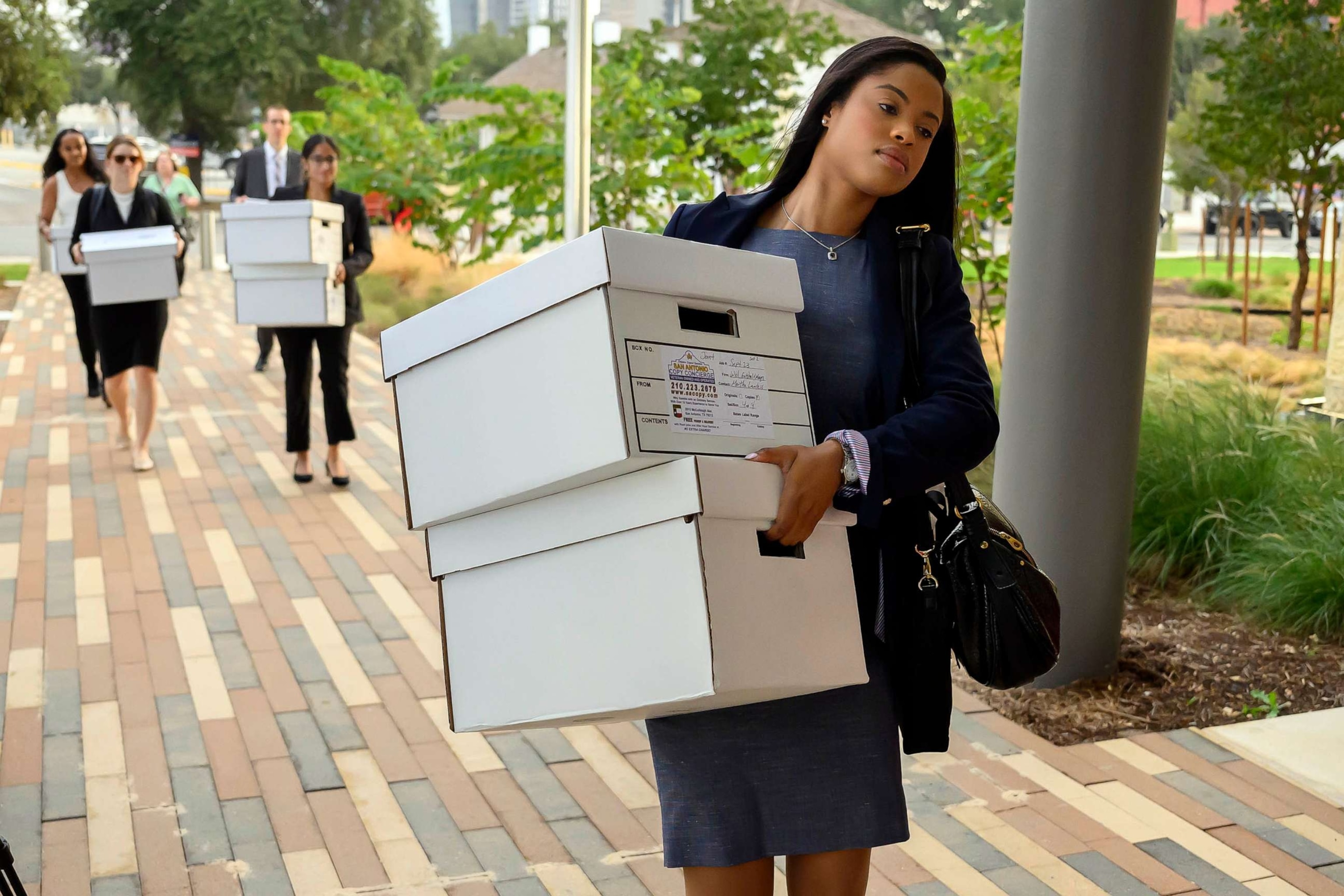一场联邦审判正在展开该州2021年投票权法违反了美国宪法。
该诉讼代表La Union del Pueblo(LUPE)和其他团体提出,认为某些条款德克萨斯州参议院法案1使得投票变得更加困难,特别是对于教育程度较低、不会说英语和需要投票帮助的残疾人来说。
审判于9月11日开始,预计将持续几周。
S.B. 1进一步赋予党派投票观察员权力,并进一步提高邮寄投票的身份证要求。它还禁止像哈里斯县这样的地方为响应新冠肺炎而实施的投票方法,如免下车和24小时投票。哈里斯县是美国人口第三多的县,也是得克萨斯州最大的县。
休斯顿所在的哈里斯县在过去十年中越来越多地投票给民主党,而德克萨斯州虽然仍然经常投票给共和党,但在联邦选举中已经变得不那么保守了。
此外,S.B. 1禁止选举官员通过邮件宣传投票或分发未经请求的缺席选票。
邮件投票受到了一些保守派的批评,如前总统唐纳德·特朗普,尽管自疫情以来它变得更加普遍。特朗普和其他人声称,在没有证据的情况下,它更容易受到广泛的欺诈。
新的诉讼对这些条款和其他条款提出了挑战。在他们的诉状中,LUPE声称S.B. 1违反了美国宪法第一、第十四和第十五修正案,以及选举权法案、美国残疾人法案和康复法案。
共和党人得克萨斯州参议员布赖恩·休斯起草了该法案,称其为“保护选举诚信”和“防止欺诈”的努力
在2021年8月发布到德克萨斯州公共政策基金会网站的一篇帖子中,休斯写道,“我很自豪能够帮助领导恢复对我们选举系统的信心的努力。这就是SB 1的意义所在,真的——它不是试图推翻任何先前的选举,或确保任何一个政党拥有永久的多数席位。”
休斯写道,新的身份要求是该法案下“德克萨斯州投票中最大的变化”。他将这一具体条款描述为“增加了一个简单的步骤,以帮助确保邮寄选票是真实的。”
但是原告的律师,如墨西哥裔美国人法律辩护和教育基金(MALDEF)的诉讼副总裁尼娜·佩莱斯(Nina Perales),认为S.B.1确实实现了其他一些东西。
“相反,它限制了德克萨斯州的投票权,”佩莱斯说。

9月11日,布伦南司法中心的Robyn Sanders律师抵达美国德克萨斯州西区地方法院,参加挑战德克萨斯州参议院法案1中限制性投票条款的审判...显示更多undefined
达伦·阿巴特/美联社,档案
代表LUPE的布伦南中心律师肖恩·莫拉莱斯-多伊尔告诉美国广播公司新闻,该法案的负面影响已经出现,并在2022年的地方选举中显而易见,当时“成千上万的选票被合格选民拒绝。”
根据佩拉斯的说法,邮寄选票要求两个识别选项中的一个,要么是驾照号码,要么是社会安全号码,让许多选民猜测他们的选民登记与哪个相关联。
哈里斯县选举管理办公室的通讯主任Nadia Hakim举例说明了为什么这些选票被拒绝,他告诉ABC新闻,“比如说,你有一个70岁的人。他们正在提交他们的年度邮件投票申请,他们提交了他们的社会安全号码的最后四位数字,但我们存档的是他们的德克萨斯州驾照号码。这些数字可能都是真的,但并不完全匹配。所以我们必须将该申请标记为拒绝。”
“我们看到参议院法案1影响的第一次重大选举是2022年3月1日的初选,不幸的是,我们的办公室不得不标记,我相信,这是近20%的邮件选票。所以这些是没有计算在内的邮寄选票,因为它们必须被标记为拒绝,”哈基姆说。
随着该法案通过以来的第一次总统选举迅速临近,明年,卢佩认为,该法案的全面限制效果尚未看到。
莫拉莱斯-多伊尔说:“[S.B. 1]可能会对总统年产生更大或不同的影响,届时将有更多的选民参加投票,2022年没有投票的选民很可能会投票,所以尚未经历过填写驾照号码并被拒绝这一繁琐程序的人将在2024年首次经历这一过程。”
根据FiveThirtyEight的数据,由于共和党人错误地认为2020年的选举是从特朗普那里偷走的,美国在2021年经历了前所未有的投票限制。这种趋势没有持续到2023年,相反,立法使美国人更容易投票。
莫拉莱斯-多伊尔说,“我们希望这次审判将产生重大影响,因为我们将得到一项法院裁决,责令执行S.B. 1的一些条款。”
他们的案件已经与其他一些有自己的原告和律师的案件合并在一起。
签署了S.B. 1的州长格雷格·阿博特(Greg Abbott)没有回应ABC新闻的置评请求。
Major voting rights trial is unfolding in Texas: What to know
A federal trial is unfolding over whethera 2021 voting rights law in the stateviolates the U.S. Constitution.
The suit -- brought on behalf of La Union del Pueblo, or LUPE, and other groups -- argues that certain provisions ofTexas Senate Bill 1have made voting more difficult, especially for less-educated, non-English-speaking and disabled populations in need of voting assistance.
The trial began on Sept. 11 and is expected to continue for the next few weeks.
S.B. 1 further empowers partisan poll watchers and further enhances ID requirements for voting by mail. It also bans balloting methods that places like Harris County, the third most populous county in the U.S. and the largest in Texas, implemented in response to COVID-19, such as drive-through and 24-hour voting.
Harris County, home to Houston, has increasingly voted Democratic in the last decade -- at the same time that Texas, while still often voting Republican, has shifted to be less conservative in federal elections.
Additionally, S.B. 1 prevents election officials from promoting vote by mail or distributing unsolicited absentee ballots.
Mail voting has been criticized by some conservatives, like former President Donald Trump, even as it has become more common since the pandemic. Trump and others claim, without evidence, that it's more vulnerable to widespread fraud.
The new suit challenges these and other provisions. In their complaint, LUPE claims S.B. 1 violates the U.S. Constitution's first, 14th and 15th amendments as well as the Voting Rights Act, the Americans with Disabilities Act, and the Rehabilitation Act.
Texas Sen. Bryan Hughes, a Republican, authored the bill, characterizing it as an effort to "protect election integrity" and "prevent fraud."
In an August 2021 post to the Texas Public Policy Foundation's website, Hughes wrote, "I'm proud to have helped lead the effort to restore confidence in our election system. And that's what SB 1 is about, really—it's not an attempt to overturn any prior election, or to ensure any one party has a permanent majority."
Hughes wrote that the new identification requirements were the "biggest change in voting in Texas" under the bill. He characterized that specific provision as "the addition of a simple step to help ensure that mail-in ballots are genuine."
But lawyers for the plaintiffs, like Nina Perales, vice president of litigation for the Mexican American Legal Defense and Educational Fund (MALDEF), believe S.B.1 really accomplishes something else.
"It instead restricts the ability to vote in Texas," Perales said.
Sean Morales-Doyle, an attorney for The Brennan Center, which is representing LUPE, told ABC News that negative repercussions from the bill are already being seen and were apparent in the 2022 local elections, when "tens of thousands of ballots being rejected from eligible voters."
According to Perales, mail-in ballots ask for one of two identifying options, either a driver's license number or Social Security number, leaving many voters guessing which their voter registration is linked to.
Nadia Hakim, director of communications for Harris County's Elections Administration's Office, gave an example as to why those ballots are being rejected, telling ABC News, "So let's say, you have someone who is 70 years old. They're submitting their annual mail ballot application, they send in the last four digits of their Social Security number, but what we have on file is their Texas driver's license number. Those numbers both may be true, but it's not an exact match. So we would have to flag that application for rejection."
"The first major election where we saw the impact of Senate Bill 1, was the March 1, 2022 primaries, and unfortunately our office had to flag, I believe, it was almost 20% of mail ballots that came in. So those are mail ballots that weren't counted because they had to be flagged for rejection," Hakim said.
With the first presidential election since the bill's adoption swiftly approaching, next year, LUPE contends the full restrictive effects of the bill have yet to be seen.
"It [S.B. 1] may have an even greater impact or a different impact on a presidential year when more voters are turning out to vote, and voters who didn't vote in 2022 are likely to be voting, so people who haven't already been through this rigmarole of putting their license number down and having it rejected are going to be going through that for the first time in 2024," Morales-Doyle said.
According to FiveThirtyEight data, the United States saw an unparalleled year of voting restrictions in 2021 spurred by Republicans' false belief that the 2020 election was stolen from Trump. That trend hasn't carried through to 2023, with legislation that instead made it easier for Americans to vote.
"The hope is that this trial will have a big impact, because we'll get a court ruling enjoining the enforcement of a number of provisions of S.B. 1," Morales-Doyle said.
Their case has been consolidated with a number of others that have their own plaintiffs and counsel.
Gov. Greg Abbott, who signed S.B. 1, did not respond to ABC News' request for comment.





